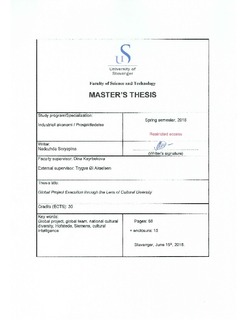| dc.contributor.advisor | Kayrbekova, Dina | |
| dc.contributor.author | Seryapina, Nadezhda | |
| dc.date.accessioned | 2018-10-04T08:13:56Z | |
| dc.date.available | 2018-10-04T08:13:56Z | |
| dc.date.issued | 2018-06-15 | |
| dc.identifier.uri | http://hdl.handle.net/11250/2566311 | |
| dc.description | Master's thesis in Industrial economics | nb_NO |
| dc.description.abstract | Globalization has an impact on the workplace environment. Being part of the global business does not appear to be the same as operating in the local environment. Global projects are characterized by substantial financing and ambitious goals. The complexities encountered in cross-border projects can threaten the successful results. By completing this thesis, the researcher sought to understand how to achieve improved project performance in the global setting.
Using systematic process, the study involves both body of knowledge review and target group experience with the phenomenon using exploratory analysis. Empirical data collection was performed through the project statements and interviews with project leaders at Siemens in relation to global oil and gas business. The interviewed senior professionals have experience with leading global projects and international teams in almost all main oil and gas regions, such as Europe, USA, Asia and the Middle East.
By completing the academic literature research, focus of this study was narrowed to one of the primary global project success contributors – project team, where cultural differences appear as a key success variable. Studies related to national cultural diversity completed the theoretical framework of this thesis. The theory-guided framework relies on Geert Hofstede’s cultural theory, Kogut and Singh’s cultural distance index calculations and Turner’s project phase’s cultural profile concept.
Experience of project leaders in the field of global projects and global teams showed that all culturally related decisions are made rather intuitively and there is no practically applied model used within the industry representative company.
With the completion of empirical evidence analysis, the research proposes a framework which has a prospect of contributing to improved global project performance with regard to cultural diversity. This framework could enable project leaders to design teams that could potentially deliver better results, driving project through successful execution. This concept can help effective resource allocation, as well as activity delegation to compatible entities worldwide. The outcome of this thesis may form a basis for future practical model development.
The essential idea of this thesis is to show that there are no right or wrong cultural attributes, each nation has an equal right to be a participant of the global business. The principal goal is to use the cultural diversity as one of the instruments in achieving the improved project performance through the balance between project activities, project team and project leadership. | nb_NO |
| dc.language.iso | eng | nb_NO |
| dc.publisher | University of Stavanger, Norway | nb_NO |
| dc.relation.ispartofseries | Masteroppgave/UIS-TN-IØRP/2018; | |
| dc.subject | Hofstede | nb_NO |
| dc.subject | Siemens | nb_NO |
| dc.subject | global project | nb_NO |
| dc.subject | global team | nb_NO |
| dc.subject | national cultural diversity | nb_NO |
| dc.subject | cultural intelligence | nb_NO |
| dc.subject | industriell økonomi | nb_NO |
| dc.subject | globalisering | nb_NO |
| dc.subject | prosjektledelse | nb_NO |
| dc.title | Global Project Execution through the Lens of Cultural Diversity | nb_NO |
| dc.type | Master thesis | nb_NO |
| dc.subject.nsi | VDP::Samfunnsvitenskap: 200::Økonomi: 210 | nb_NO |
